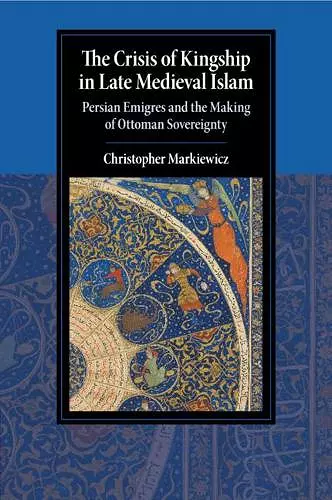The Crisis of Kingship in Late Medieval Islam
Persian Emigres and the Making of Ottoman Sovereignty
Format:Paperback
Publisher:Cambridge University Press
Published:24th Sep '20
Currently unavailable, and unfortunately no date known when it will be back
This paperback is available in another edition too:
- Hardback£106.00(9781108492140)

Explores how a new conception of kingship helped transform the Ottoman Empire, from regional dynastic sultanate to global empire.
Examines how ideological and administrative crises within Islamic lands in the late fifteenth century brought about a new conception of kingship for the early modern period. Through Idris Bidlisi, a major intellectual and statesman, this book paints a picture of a changing Ottoman Empire: shifting from regional dynastic kingdom to global empire.In the early sixteenth century, the political landscape of West Asia was completely transformed: of the previous four major powers, only one - the Ottoman Empire - continued to exist. Ottoman survival was, in part, predicated on transition to a new mode of kingship, enabling its transformation from regional dynastic sultanate to empire of global stature. In this book, Christopher Markiewicz uses as a departure point the life and thought of Idris Bidlisi (1457–1520), one of the most dynamic scholars and statesmen of the period. Through this examination, he highlights the series of ideological and administrative crises in the fifteenth-century sultanates of Islamic lands that gave rise to this new conception of kingship and became the basis for sovereign authority not only within the Ottoman Empire but also across other Muslim empires in the early modern period.
'This belongs among the best treatments that combine intellectual and sociopolitical history based on Islamic materials. Markiewicz's dense presentation of the life and work of Idris Bidlisi shows both how ideas matter for the conduct of politics and why they must be understood as responses to specific historical situations. The book is essential reading for scholars concerned with the Ottoman, Aqquyunlu, and Safavid empires as well as with Persian as a medium for historiography and the chancery.' Shahzad Bashir, Aga Khan Professor of Islamic Humanities, Brown University, Rhode Island
'A masterly study, deeply researched, many-layered and carefully nuanced. Markiewicz offers keen insights into a little known scholarly and philosophical world, and widens the scope of debate about the Ottoman self-image in the crucial era after 1517. Approaching the topic through the thought and influence of Idris Bidlisi makes a potentially impenetrable mass of esoteric thought clearly accessible to modern researchers.' Christine Woodhead, Honorary Fellow of Ottoman History, University of Durham
'This is an old-school monograph in the of best ways; it is extremely focused and necessary reading for experts in the field.' R. A. Miller, Choice
'… an admirable biography of a major scholar and scribe as well as a rich study of intellectual activity in the 15th–century and 16th–century … makes important contributions to Islamic political thought, as well as to the nexus between patronage, literary culture, and intellectual output, especially in historical writing. It is also an excellent biography.' Ethan L. Menchinger, International Journal of Middle East Studies
'Markiewicz's reworking of his PhD thesis has produced a book that is complex in its ideas and argument, beautifully structured, written in clear and well-signposted prose, and cleanly produced in the Cambridge Studies in Islamic Civilization series.' Amy Singer, Speculum
ISBN: 9781108710572
Dimensions: 229mm x 151mm x 19mm
Weight: 538g
364 pages